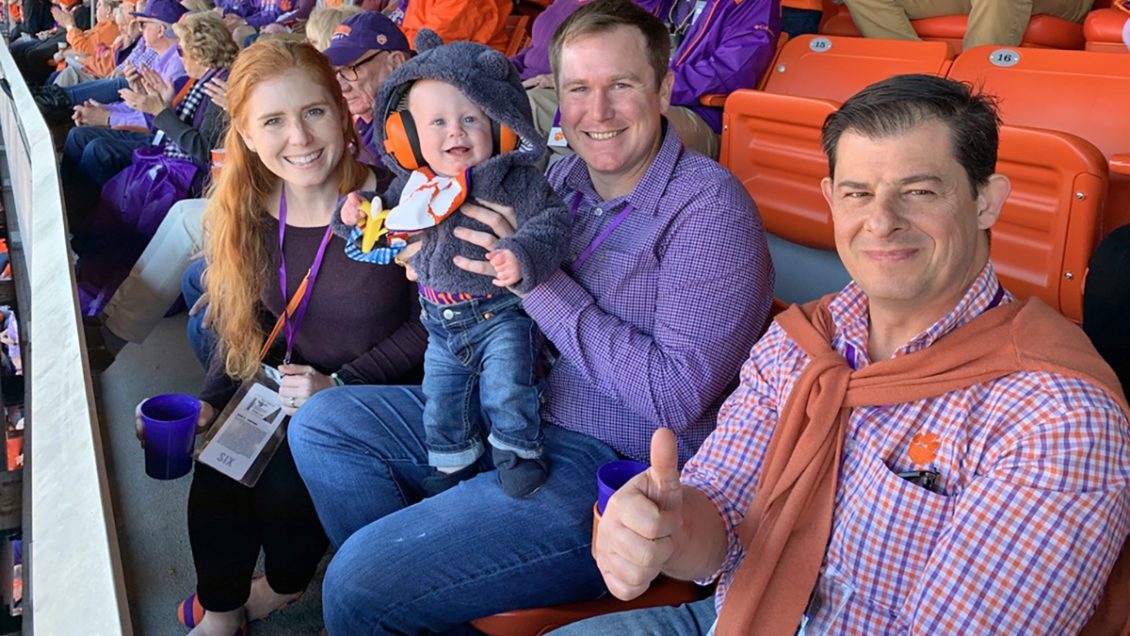CLEMSON — Like his father and grandfather before him, Captain Bryan Lagasse (M.S. chemistry 2020) is serving his country as an officer in the U.S. Army. After graduating from Clemson in May, Lagasse is heading to West Point to become a chemistry faculty member at the same institution where he earned his bachelor’s degree a decade earlier.

“My time at Clemson has been a great opportunity to reconnect with the academic world,” Lagasse said. “It has been rewarding to develop relationships and partnerships with Clemson faculty and students, and particularly Dr. Garcia.”
For his master’s thesis, Lagasse conducted research in chemistry professor Carlos Garcia’s lab for the past 22 months, developing a low-cost and effective way to degrade a variety of lethal chemical warfare agents. Current methods rely on processes like hydrolysis, high-pressure peroxides or oxidation reactions, which are effective but require large quantities of decontamination agents and produce hazardous byproducts.
At the heart of Lagasse’s work is a method known as pyrolysis, where carbon-based compounds are heated to extremely high temperatures (1000 °C) in the absence of oxygen. Garcia applied this process a few years ago when his group used his novel technique to make paper-derived electrodes for sensors, that had applications in food safety and human health.
Lagasse took that experience and applied the technology to pyrolyze cotton balls that were then coated with a flammable substance so as to degrade chemical warfare agents like VX, sarin, and sulfur mustard into minimally toxic byproducts.
For security and safety reasons, Lagasse used simulants in his experiments rather than the highly toxic and lethal agents.
“These simulants have similar chemical structures and reactivity than the actual agents,” Lagasse said. “The cotton balls treated by this process maintain their 3D shape and repel water, which allows us to put the incendiary agent on them, so we can burn the simulants without extinguishing the flame and, in turn, neutralize the agent.”
Lagasse obtained the results as a collaboration with researchers at the Southwest Research Institute (SwRI), and funded by the Defense Threat Reduction Agency. SwRI scientists will use these results to determine what the potential effects will be with real agents and whether this is a viable way to efficiently dispose of chemical weapons in the field without yielding any harmful byproducts.
“Bryan came to our program right when the project needed the contribution from someone with a solid military background,” Garcia said. “That, and his incredible commitment to the project, made everything possible.”
Lagasse’s military career has included a nine-month deployment to Eastern Afghanistan, where his platoon of about 40 soldiers trained local forces on security tactics so they’d be better prepared to in their duties as the U.S. military drew down forces in Afghanistan.
“My company and platoon worked with police agencies on screening procedures to prevent the smuggling of improvised explosive devices (IEDs) and related materials into the country,” Lagasse said. “It was an interesting and rewarding experience.”

Following his overseas tour, Lagasse completed additional training at Fort Benning in Georgia and earned a master’s degree in organizational leadership from Columbus State University. After that, he was stationed in Hawaii for three years, working as a brigade assistant operations officer and company commander.
When the Army selected him to become an instructor at West Point, he had two years to earn a master’s degree at the school of his choice. He chose Clemson, in part, to be close to family who live in the Southeast. In addition, his wife Leah McMillion Lagasse (B.S. health sciences 2011), who was expecting the couple’s first child in 2018, is a Clemson alumna.
In their spare time, the couple and their now 1-year-old son Mac enjoy being outdoors and exploring new places with their three dogs. The couple are avid runners and have completed several marathons together while raising money for charities that support wounded veterans or families who have lost a service member in combat.
When his faculty assignment ends in three years, Lagasse plans to work on policies related to weapons of mass destruction and perhaps conduct research at one of the national labs.
“My potential assignments have a wide scope and could include duties advising military commanders, congressional staffs or Army research labs on the counter proliferation of weapons of mass destruction,” he said. “One of my goals is to help to shape weapons of mass destruction policy for the United States.”
Get in touch and we will connect you with the author or another expert.
Or email us at news@clemson.edu

